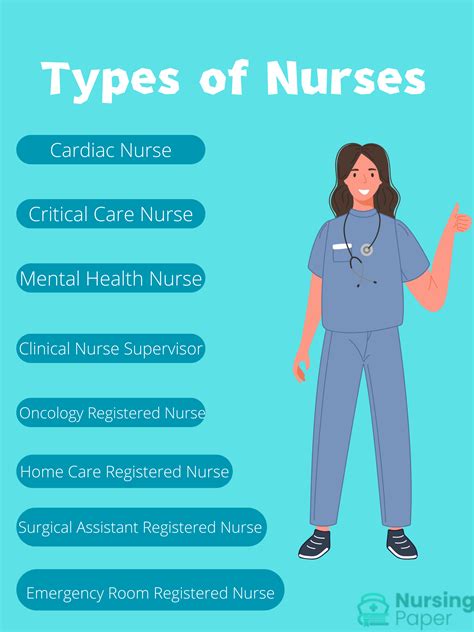Different Careers In Nursing

Nursing is an incredibly diverse and rewarding field, offering a wide array of career paths and specializations. With an ever-growing demand for skilled healthcare professionals, nursing careers have evolved to meet the diverse needs of patients and healthcare systems. This article explores the multifaceted world of nursing, highlighting the various career paths available, the unique roles and responsibilities associated with each, and the impact these professionals have on patient care and healthcare outcomes.
The Evolution of Nursing Careers

The traditional role of a nurse has expanded significantly over the years. Once primarily focused on bedside care and patient monitoring, nursing has transformed into a multifaceted profession, with nurses now taking on leadership roles, specializing in specific medical fields, and contributing to healthcare policy and research. This evolution has opened up numerous career opportunities, allowing nurses to pursue their passions and make a profound impact on patient lives.
Registered Nurses (RNs): The Backbone of Healthcare

Registered nurses are the backbone of any healthcare system. They provide direct patient care, administer medications, perform diagnostic tests, and collaborate with other healthcare professionals to develop and implement care plans. RNs are versatile, working in various settings such as hospitals, clinics, long-term care facilities, and community health centers.
Specialized Roles within RN Practice
Within the realm of registered nursing, there are numerous specializations. Here are some of the most common paths:
- Critical Care Nursing: These nurses care for critically ill patients in intensive care units (ICUs). They require advanced skills in monitoring and managing complex conditions.
- Pediatric Nursing: Pediatric nurses specialize in caring for infants, children, and adolescents. They must understand the unique physiological and psychological needs of young patients.
- Oncology Nursing: Oncology nurses work with cancer patients, providing support and care throughout diagnosis, treatment, and recovery. They play a crucial role in managing symptoms and side effects.
- Emergency Nursing: In emergency departments, these nurses assess and stabilize patients with acute illnesses or injuries. Quick decision-making and critical thinking are essential skills.
- Nurse Anesthetists: Certified Registered Nurse Anesthetists (CRNAs) administer anesthesia and provide pain management before, during, and after surgical procedures.
Advanced Practice Registered Nurses (APRNs): Expanding the Scope of Nursing
Advanced Practice Registered Nurses are RNs who have completed graduate-level education and advanced clinical training. They can provide a wide range of healthcare services and often work autonomously, with a high degree of responsibility and authority.
Common APRN Roles
- Nurse Practitioners (NPs): NPs assess, diagnose, and treat patients, often serving as primary care providers. They can prescribe medications and order diagnostic tests, providing comprehensive healthcare services.
- Clinical Nurse Specialists (CNSs): CNSs have expertise in a specific clinical area, such as cardiology or gerontology. They provide specialized care, educate patients and families, and often serve as mentors to other nurses.
- Certified Nurse-Midwives (CNMs): CNMs provide healthcare services to women throughout their lifespan, with a focus on childbirth and gynecological care. They assist with normal deliveries and manage low-risk pregnancies.
- Nurse Educators: These nurses play a crucial role in nursing education, teaching future nurses and mentoring current nurses to enhance their skills and knowledge.
Nursing Leadership and Administration
Beyond direct patient care, nurses can pursue leadership and administrative roles. These positions involve managing nursing staff, ensuring quality care, and contributing to healthcare policy and strategy.
Key Leadership Roles
- Nurse Managers: Nurse managers oversee nursing units, ensuring efficient operations and high-quality patient care. They mentor staff, manage resources, and collaborate with other healthcare leaders.
- Director of Nursing: Directors of Nursing are responsible for the overall nursing services within a healthcare facility. They develop policies, oversee budgets, and ensure compliance with regulations.
- Chief Nursing Officer (CNO): As the highest-ranking nursing position, the CNO is responsible for the nursing practice and staff across an entire healthcare organization. They influence strategic decisions and advocate for nursing excellence.
Nursing Research and Innovation

Nurses contribute to the advancement of healthcare through research and innovation. They conduct studies, analyze data, and develop new strategies to improve patient outcomes and enhance the nursing profession.
Research-Focused Careers
- Research Nurses: These nurses work in research facilities, universities, or healthcare institutions, conducting clinical trials and studies to advance medical knowledge.
- Nurse Epidemiologists: Nurse epidemiologists investigate the causes and patterns of disease, contributing to public health initiatives and disease prevention strategies.
- Nurse Informaticists: Nurse informaticists utilize technology and data to improve patient care, develop healthcare information systems, and ensure the secure handling of patient data.
Nursing in Specialized Settings
Nurses also have the opportunity to work in unique and specialized settings, catering to specific patient populations or healthcare needs.
Specialized Nursing Careers
- Travel Nurses: Travel nurses work on temporary assignments across the country, filling staffing gaps in various healthcare facilities. They gain diverse experiences and often have higher pay rates.
- School Nurses: School nurses provide healthcare services to students, managing illnesses and injuries, administering medications, and promoting health education within schools.
- Nurse Navigators: Nurse navigators guide patients through complex healthcare systems, providing education, support, and coordination of care, especially for patients with chronic or complex conditions.
- Forensic Nurses: Forensic nurses provide specialized care to victims of trauma, abuse, or violence. They collect evidence, testify in court, and provide emotional support to victims.
The Impact of Nursing Careers
The diverse careers within nursing have a profound impact on healthcare outcomes. Nurses play a crucial role in patient education, disease prevention, and health promotion. Their compassion, expertise, and dedication make them invaluable members of the healthcare team, contributing to better patient experiences and improved health across communities.
| Career Path | Impact on Healthcare |
|---|---|
| Registered Nurses | Provide direct patient care, ensuring quality and continuity of healthcare services. |
| Advanced Practice Nurses | Expand access to healthcare by serving as primary care providers and specialists. |
| Nursing Leadership | Influence healthcare policies, ensure quality standards, and mentor nursing staff. |
| Nursing Research | Advance medical knowledge, improve patient outcomes, and innovate healthcare practices. |

Frequently Asked Questions
What are the educational requirements for becoming a nurse?
+
To become a registered nurse, you typically need a Bachelor of Science in Nursing (BSN) degree or an Associate Degree in Nursing (ADN). Advanced practice nurses require a Master of Science in Nursing (MSN) or a Doctor of Nursing Practice (DNP) degree.
How do I choose a nursing specialization?
+
Choosing a nursing specialization depends on your interests and the population or field you wish to work with. Consider your passions, strengths, and the impact you want to have on patient care.
What are the benefits of pursuing an advanced nursing degree?
+
Advanced nursing degrees, such as an MSN or DNP, open up opportunities for leadership roles, specialized practice, and higher salaries. They also enhance your clinical expertise and critical thinking skills.
Can nurses work in non-clinical settings?
+
Absolutely! Nurses can work in various non-clinical roles, such as healthcare administration, nursing education, research, and policy development. These roles contribute to the overall functioning and improvement of the healthcare system.
What are some challenges faced by nurses in their careers?
+
Nursing careers can be physically and emotionally demanding. Common challenges include long work hours, high-stress environments, and the need for continuous learning to stay updated with medical advancements.



